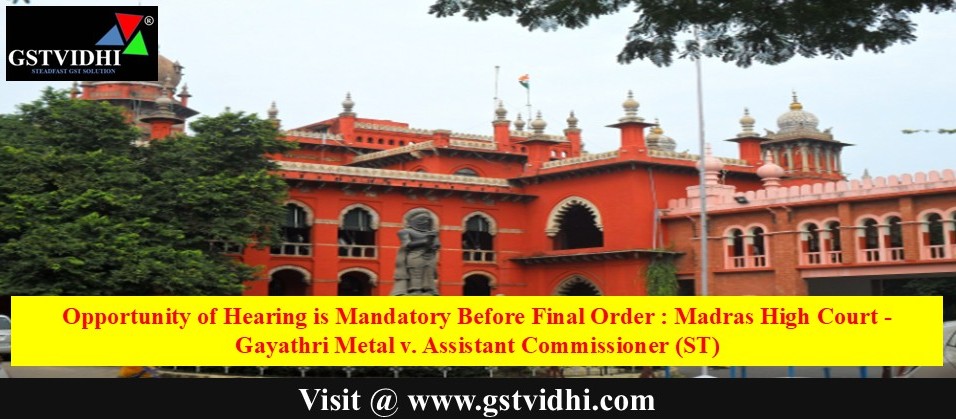
Opportunity of Hearing is Mandatory Before Final Order : Madras High Court - Gayathri Metal v. Assistant
Commissioner (ST)
Summary of
the Case
The Madras High Court
quashed the GST rectification order issued against Tvl Sri Gayathri Metal,
observing that no personal hearing was granted, and notices were merely
uploaded to the portal without effective communication. The Court held that
such a service of notice, though technically valid, fails the test of substantive
natural justice when the taxpayer remains unaware, and directed a fresh
opportunity to be provided.
· Tvl
Sri Gayathri Metal v. Assistant Commissioner (ST)
·
Court:
High Court of Judicature at Madras
·
Order No.:
W.P.No.25743 of 2025 & W.M.P.Nos.28939 & 28943 of 2025
Date of Order: 17.07.2025
Brief Facts
of the Case
- The petitioner was issued a rectification
order dated 19.03.2025 under Section 74 of the CGST/TNGST Act, 2017
for the financial year 2022-23.
- The order was uploaded online with
summary in Form DRC-08.
- The petitioner was unaware of the
notices as all communication was placed only under the “View Additional
Notices and Orders” tab of the GST portal.
- Consequently, no reply or
objection was filed, and no personal hearing was granted.
- The petitioner later found that ₹11,54,029
had already been recovered by the department, out of the total disputed
tax liability of ₹38,18,866.50.
- Aggrieved, the petitioner approached
the High Court under Article 226 of the Constitution seeking to quash the
rectification order and refund the amount recovered.
Submissions
by the Petitioner
Counsel: Ms. Aparna
Nandakumar
- The petitioner was unaware of the
notices as they were not served in person, by post, or email, but
merely uploaded online.
- Consequently, no opportunity was
given to reply or to be heard, thereby violating the principles of
natural justice.
- Since a substantial amount was
already recovered, the petitioner requested that the order be quashed
and an opportunity be granted to defend the case afresh.
Submissions
by the Respondent
Counsel: Mr. V.
Prashanth Kiran, Government Advocate
- Admitted that notices were only
uploaded on the portal and no other form of service (such as RPAD,
email, or physical notice) was used.
- Conceded that no personal hearing
was provided before passing the impugned order.
- Agreed that the matter could be remanded
for fresh consideration after giving proper notice and hearing.
Court's
View and Reasoning
The Court emphasized the
following principles:
1. Uploading
on GST Portal = Formal Service, Not Effective Communication
o While
service via portal is legally valid, the purpose of service is not
met if the taxpayer remains unaware.
o GST
officers should consider using other modes under Section 169(1) of the CGST
Act, including RPAD (Registered Post with Acknowledgment Due), email, or
physical delivery.
2. Opportunity
of Hearing is Mandatory Before Final Order
o Failure
to issue a personal hearing notice, especially when the taxpayer has not
responded, violates the natural justice principle.
o The
Court criticized the respondent for passing an ex parte order without
making additional efforts to serve the notices effectively.
3. Consequences
of Poor Service and Hasty Orders
o Such
conduct wastes administrative and judicial time, causing multiple
litigations and unnecessary burden on tax authorities and courts.
Final
Judgment
The Court passed the
following directions:
1. Impugned
Order dated 19.03.2025 is set aside.
2. The
matter is remanded back to the respondent for fresh adjudication.
3. The
petitioner must file reply/objection within 3 weeks from receipt of the
Court's order.
4. The
respondent must:
o Issue
14 days' clear notice for personal hearing.
o Pass
a fresh speaking order on merits and in accordance with law,
after hearing the petitioner.
5. No
costs were awarded. Miscellaneous petitions were also
closed.
Conclusion
This judgment reinforces
the principle that mere technical compliance is not enough under GST
law. Service of notice must be effective, and taxpayers must be given a fair
opportunity to present their case, especially before recovery proceedings
begin. The judgment promotes transparency, accountability, and procedural
fairness in GST adjudication.
Disclaimer: All the Information is based on the notification, circular advisory and order issued by the Govt. authority and judgement delivered by the court or the authority information is strictly for educational purposes and on the basis of our best understanding of laws & not binding on anyone.
Find the Attachment (Press on Click Here )
Click here